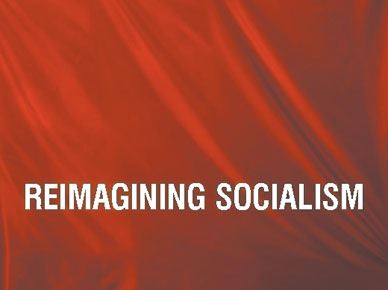 AVENGING ANGELS
AVENGING ANGELS
Socialism’s all the rage. "We Are All Socialists Now," Newsweek declares. As the right wing tells it, we’re already living in the USSA. But what do self-identified socialists (and their progressive friends) have to say about the global economic crisis? In the March 4, 2009, issue, we published Barbara Ehrenreich and Bill Fletcher Jr.’s "Rising to the Occasion" as the opening essay in a forum on "Reimagining Socialism." TheNation.com will feature new replies to their essay over the coming weeks, fostering what we hope will be a spirited dialogue.
The crisis confronting capitalism is a vivid demonstration of the vapidity that underlay the appeal of globalization (a k a the Washington Consensus) as a mantra for all seasons, all times, all countries and all continents. Mass unemployment once again threatens the advanced capitalist world, as it has during thirty-four business cycles since 1854. Ehrenreich and Fletcher map today’s conditions, underline the weaknesses of the left on every level and then pose the old question, What is to be done?
Before addressing the question, a few points of disagreement. Despite mocking those on the left who, in the past, saw every downturn as an opportunity to proclaim that the end of capitalism was nigh, the authors fall into the same trap. This time, we are told, the "patient may not get up from the table." I don’t agree. Capitalism is always faced with crises, which are part of the deadly logic of an economy based on a state-buttressed market system. It has failed many times before but has recovered, including during periods when it confronted real political challenges. Its ability to adapt and survive should not be underestimated, even though it will do so, as before, at the expense of the majority it exploits.
Until the emergence of a viable sociopolitical and economic alternative, perceived by a majority as such, there will be no final crisis of capitalism. In order to save themselves, today’s elites will consider approaches to the crisis that preserve the status quo. The choice they are faced with domestically is between establishing a public utility credit and banking operation geared to reviving a productive sector, or shoring up a discredited, deregulated Wall Street/City of London operation based on fictive capital. The bailouts in New York and London are designed to do the latter. Globally, it’s more difficult to accept a loss of Atlanticist control, but if pressure continues to mount, the Far Eastern bloc might suggest a new set of institutions based on multilateral rather than imperial control, leading to dismantling but also renewal.
Popular
"swipe left below to view more authors"Swipe →
What of the alternatives? With the post-1990 entry of capitalism into Russia, China, Vietnam, etc., the global media networks crowed that the capitalist Cinderella had defeated the ugly sisters, communism and socialism. The shift was experienced by a majority of the world’s less-privileged citizens as a collapse of all anti-capitalist perspectives.
A new mood for change developed slowly: the Caracazo in 1989, Seattle a decade later, followed by the birth of a World Social Forum to counter the ideology of Davos, followed by a set of mass social movements in South America. The dramatic collapse of the Argentinian economy led to workers’ self-management experiments, factory occupations and district soviets (councils) in Buenos Aires to discuss a different future. In Venezuela, Bolivia, Ecuador and Paraguay, the social movements challenging the neoliberal order produced governments that represented a new form of radical social democracy that seeks to combine state, socialized, cooperative, small-scale private and individual enterprises. These popularly elected governments broke the isolation of Cuba and obtained its help in constructing health and education infrastructures that benefit the majority. If Cuba, in turn, learned the importance of political pluralism from its new allies, the results would be beneficial.
What happens in Latin America is important for the United States. The backyard has moved indoors. The large Hispanic population within US borders maintains links with its past. The effect has sometimes been negative–e.g., among Cubans in Florida, but there, too, the mood is changing. The social movements in South America challenged deregulation and privatization more effectively than organized labor has done in North America or Western Europe. If adopted in the United States, this model could build popular pressure for a nationalized health service, massive investment in education and reduced military spending, and against bailouts for the car industry and sinking airlines. Let them fall, so that a public transportation infrastructure can be built based on an ecologically sound and more efficient train service that serves the needs of all. Without action from below, there will be no change from above.
Other Contributions to the Forum
Immanuel Wallerstein, "Follow Brazil’s Example"
Bill McKibben, "Together, We Save the Planet"
Rebecca Solnit, "The Revolution Has Already Occurred"
Robert Pollin, "Be Utopian: Demand the Realistic"
John Bellamy Foster, "Economy, Ecology, Empire"
Christian Parenti, "Limits and Horizons"
Doug Henwood, "A Post-Capitalist Future is Possible"
Mike Davis, "The Necessary Eloquence of Protest"
Lisa Duggan, "Imagine Otherwise"
Vijay Prashad, "The Dragons, Their Dragoons"


